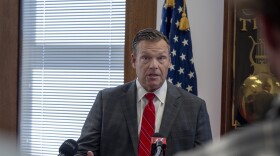-
Last year was the deadliest year in ICE detention in two decades. Nearly a quarter of those deaths occurred in Texas.
-
Denver Health told Medicaid patients that “limited” personal information could be shared with U.S. Immigration and Customs Enforcement
-
The Trump administration's plan to build new border wall segments through sensitive nature areas is being challenged by RGV protestors.
-
The sudden and surprising airspace closure over El Paso, Texas, stemmed from the Pentagon's plans to test a laser for use in shooting down drones used by Mexican drug cartels. That's according to three people familiar with the situation who were granted anonymity to share sensitive details.
-
University of Kansas Medical Center nephrologist Dr. Jason Stubbs thinks his research could help millions of Americans who are living with chronic kidney disease, but he's still waiting to hear if the National Institutes of Health will fund his latest grant application.
-
The lawsuit is one piece of Kobach’s broad range of anti-immigration efforts.
-
Several media outlets, quoting anonymous federal officials, reported that hundreds of Texas troops could be coming home soon from the Chicago area after their activation was halted by a federal court.
-
Texas' application for the Rural Health Transformation program requests $200 million every year of the five-year program. The state is proposing the "Rural Texas Strong" project, which includes a range of proposals to improve health care access and quality in rural areas — such as workforce development and utilizing AI.
-
As federal workers continue to live without work and miss their paychecks, some federal credit unions are stepping up to provide temporary financial help.
-
Food bank staff expect a wave of new demand as millions of Americans are set to lose federal food assistance in November. But they insist that their services alone won't be enough to feed everyone who relies on the Supplemental Nutrition Assistance Program.

Play Live Radio
Next Up:
0:00
0:00
Available On Air Stations










